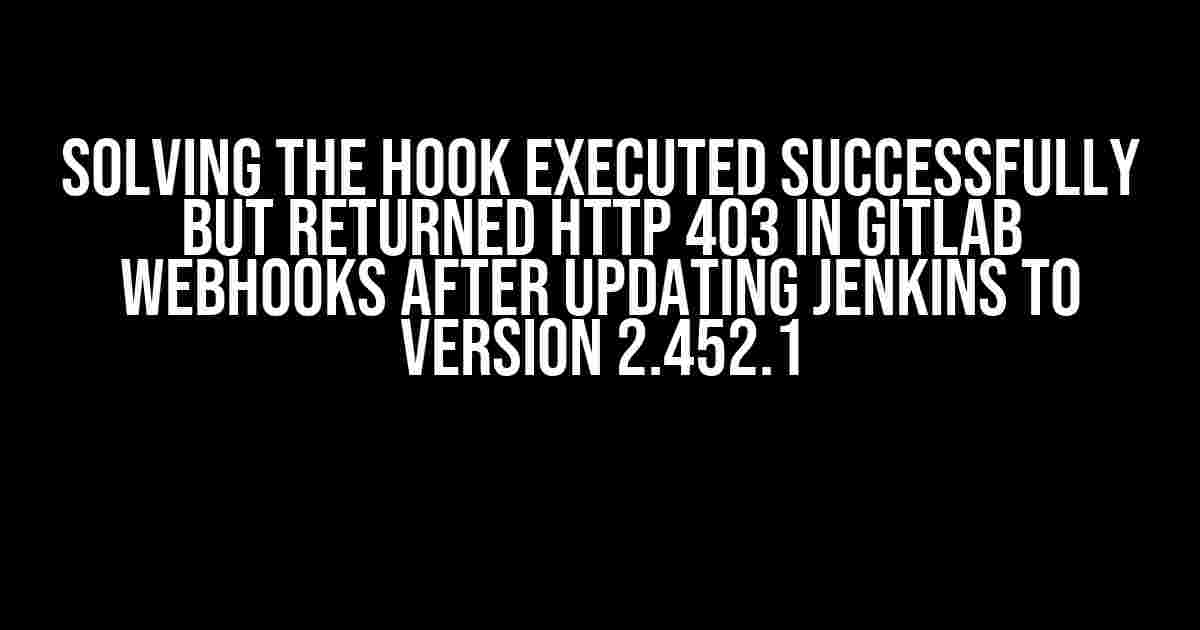After updating Jenkins to version 2.452.1, many users have reported encountering the “Hook executed successfully but returned HTTP 403” error in Gitlab Webhooks. This error can be frustrating, especially when you’re trying to integrate your Jenkins pipeline with Gitlab. In this article, we’ll explore the possible causes of this error and provide a step-by-step guide to resolving it.
Possible Causes of the Error
Before we dive into the solution, let’s first understand the possible causes of the “Hook executed successfully but returned HTTP 403” error:
-
Invalid or missing credentials: The most common cause of this error is invalid or missing credentials. Jenkins may not have the necessary permissions to access the Gitlab repository, leading to a 403 Forbidden error.
-
Incorrect webhook configuration: Misconfigured webhooks can also cause this error. If the webhook URL, secret token, or other settings are incorrect, Jenkins may not be able to send requests to Gitlab successfully.
-
Firewall or proxy issues: Firewalls or proxies can block the requests from Jenkins to Gitlab, resulting in a 403 error.
-
Outdated Jenkins plugins: Using outdated Jenkins plugins can cause compatibility issues, leading to errors like the one we’re discussing.
Resolving the Error
To resolve the “Hook executed successfully but returned HTTP 403” error, follow these steps:
-
Verify Credentials:
- Log in to your Jenkins instance and navigate to the Configure Jenkins page.
- Click on the Gitlab section.
- Check the credentials used to connect to Gitlab. Make sure they are valid and have the necessary permissions.
- If you’re using a token, verify that it’s correct and has not expired.
-
Check Webhook Configuration:
- Log in to your Gitlab instance and navigate to the Webhooks page.
- Check the webhook URL, secret token, and other settings. Make sure they match the configuration in Jenkins.
- Verify that the webhook is enabled and has the necessary permissions.
-
Check Firewall and Proxy Settings:
- Verify that your firewall or proxy settings allow requests from Jenkins to Gitlab.
- Check if any firewall rules or proxy settings are blocking the requests.
-
Update Jenkins Plugins:
- Log in to your Jenkins instance and navigate to the Plugin Manager page.
- Check for updates for the Gitlab plugin and other related plugins.
- Update the plugins to the latest version.
Conclusion
The “Hook executed successfully but returned HTTP 403” error in Gitlab Webhooks after updating Jenkins to version 2.452.1 can be frustrating, but it’s often a simple issue to resolve. By following the steps outlined in this article, you should be able to identify and fix the underlying cause of the error. Remember to verify your credentials, check your webhook configuration, check firewall and proxy settings, and update your Jenkins plugins to ensure a smooth integration between Jenkins and Gitlab.
If you’re still experiencing issues, feel free to explore other troubleshooting steps or seek help from the Jenkins and Gitlab communities.
Frequently Asked Question
Get the scoop on resolving the frustrating “Hook executed successfully but returned HTTP 403” error in Gitlab Webhooks after updating to Jenkins version 2.452.1!
What’s causing the “Hook executed successfully but returned HTTP 403” error in Gitlab Webhooks?
This error occurs due to the change in Jenkins 2.452.1 that tightens security by disabling the ‘CSRF Protection’ by default. This protection is required for Jenkins to communicate with Gitlab Webhooks, resulting in the 403 error.
How do I enable CSRF Protection in Jenkins to resolve the issue?
To enable CSRF Protection, head to Jenkins’ configuration page (typically at localhost:8080/configure) and scroll down to the ‘Security’ section. Look for the ‘Enable CSRF Protection’ checkbox and select it. Then, save your changes and try triggering the webhook again.
Is there a way to test if CSRF Protection is enabled correctly in Jenkins?
Yes, you can test by triggering the webhook manually. If CSRF Protection is enabled correctly, you should see a 200 OK response instead of the 403 error. Alternatively, you can check the Jenkins logs for any CSRF-related errors or warnings.
Will enabling CSRF Protection affect my existing Jenkins workflows or pipelines?
Enabling CSRF Protection should not impact your existing Jenkins workflows or pipelines. However, it’s always a good idea to test your workflows and pipelines after making any changes to ensure everything is working as expected.
Where can I find more information about CSRF Protection and Jenkins security?
The official Jenkins documentation and the Jenkins Security Wiki are excellent resources for learning more about CSRF Protection and Jenkins security best practices. You can also reach out to the Jenkins community forums for additional support.

